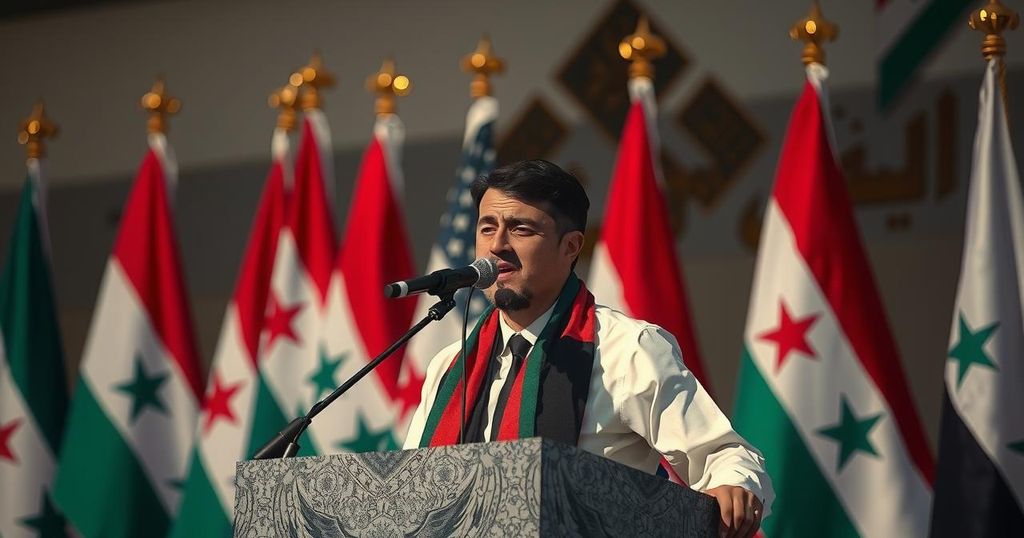Abu Mohammad al-Jolani delivered a significant victory speech at the Umayyad Mosque in Damascus, marking his ascent as a leader of Hayat Tahrir al-Sham (HTS). He focused on unity and denouncing Iran’s influence, while also reaching out to international powers like the U.S. His discourse was aimed at asserting his position and legitimacy in the evolving landscape of Syrian politics, emphasizing reform and resistance against drug trafficking prevalent under President Assad.
Abu Mohammad al-Jolani, a prominent Syrian rebel leader, delivered a victory speech at the Umayyad Mosque in Damascus, a choice underscoring both cultural significance and the weight of his message. Once an al-Qaeda fighter, he has transformed into a commander of Hayat Tahrir al-Sham (HTS), presenting himself as a unifier for the Islamic nation. In his address, he proclaimed that this victory results from collective sacrifice, thereby acknowledging the contributions of martyrs, widows, and orphans who supported the rebellion against President Bashar al-Assad.
Al-Jolani’s speech also served to signal a departure from sectarian divisions, explicitly stating that the victory marked a new chapter in Syria’s history, one that would resist Iranian influence and sectarian strife. He identified Iran’s incursions and ambitions as detrimental, implying that their time in Syria is at an end. This was particularly relevant in the context of regional power dynamics, as both Tel Aviv and Washington monitor his movements closely, recognizing him as a figure of significant importance with ties to terrorist organizations.
With an understanding of international interests, al-Jolani sought to address U.S. leaders such as President Joe Biden and President-elect Donald Trump through strategic media appearances, including an interview with CNN. He emphasized his shift away from violence, distancing himself from other extremist factions to garner support. Moreover, he assured the international community that he intends to reposition Syria away from its current reputation as a drug-trafficking hub under the Assad regime. Ultimately, al-Jolani’s statements are framed as crucial for both his ascent in Syrian politics and his survival amid a complex geopolitical landscape.
Abu Mohammad al-Jolani’s rise to prominence within the Syrian conflict reflects a broader narrative of transformation and rebranding within the spheres of extremist movements. Initially affiliated with al-Qaeda, he has evolved into a central figure in the Syrian revolution, leading Hayat Tahrir al-Sham (HTS) against Bashar al-Assad’s regime. The changing dynamics of the Syrian conflict, marked by various local and international actors, require al-Jolani to balance his claims of sectarian tolerance with the realities of the violent conflict. His strategic communication choices aim to align with regional interests while fostering a narrative aimed at legitimizing his leadership.
Abu Mohammad al-Jolani’s recent victory speech at the Umayyad Mosque encapsulates a pivotal moment in the Syrian conflict, where he aims to redefine his role and the future of Syria. By emphasizing a unified Islamic identity and denouncing foreign influence, particularly from Iran, he is strategically positioning himself not only for regional dominance but also for crucial international recognition. His call for a new chapter in Syria’s history reflects an awareness of the internal and external pressures he faces, underscoring that his actions will ultimately determine his regime’s longevity and stability.
Original Source: www.cnn.com







